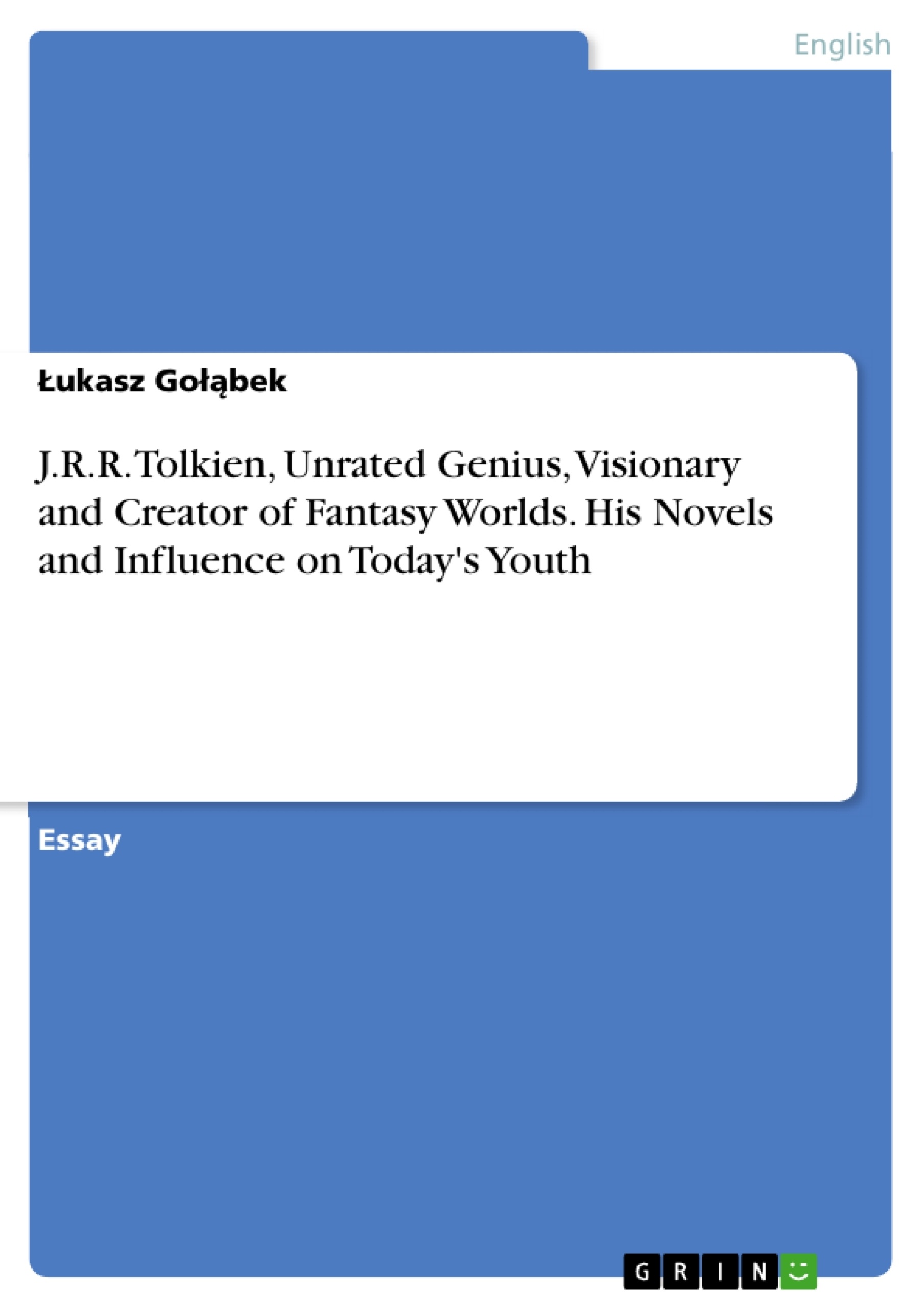Professor of Anglo-Saxon at Oxford University, a brilliant philologist, and a self-described "hobbit," J. R. R. Tolkien created two of the best-loved stories of the 20th century.
"The Hobbit" and "The Lord of the Rings" were recently made into multiple award-winning movies by director Peter Jackson for New Line Cinema.
Is Tolkien a genius, a visionary ? This paper will figure it out by tracing Tolkien's biography and determining his influence on the generations of readers and viewers that followed him.
Inhaltsverzeichnis (Table of Contents)
- Introduction
- Tolkien's Biography
- Early Life
- Education
- The Great War
- Academic Career
- Tolkien at Oxford
- “In a hole in the ground…”
- Middle-earth after J. R. R.
Zielsetzung und Themenschwerpunkte (Objectives and Key Themes)
This text aims to explore J.R.R. Tolkien's life and work, examining his genius and visionary influence on modern society, particularly within the fantasy genre. It delves into his biographical details, academic career, and the lasting impact of his creation, Middle-earth.
- Tolkien's life and formative experiences
- The development of Tolkien's fantasy world, Middle-earth
- The impact of Tolkien's work on the fantasy genre
- Tolkien's lasting legacy on contemporary society
- Tolkien's contributions to philology and scholarship
Zusammenfassung der Kapitel (Chapter Summaries)
Introduction: This introductory chapter establishes the central question of whether J.R.R. Tolkien can be classified as a genius and visionary. It defines the fantasy genre, highlighting Tolkien's pivotal role in popularizing it through his works like *The Lord of the Rings*. The introduction sets the stage for a deeper exploration of Tolkien's life and literary contributions, emphasizing the connection between his biography and his creative output.
Tolkien's Biography: This chapter provides a detailed account of Tolkien's life, from his birth in South Africa to his career as a professor at Oxford University. It highlights key events and influences that shaped his worldview and creative work, including his early life in Sarehole, his experiences during World War I, and his academic achievements. The chapter emphasizes the dichotomy between his idyllic childhood and the harsh realities of his adolescence and wartime experiences, suggesting these contrasts deeply influenced his writing. The development of his elvish languages and the creation of his "Lost Tales" are also discussed, illustrating his profound linguistic skills and his creative process.
Middle-earth after J. R. R.: This chapter focuses on the enduring legacy of Middle-earth after Tolkien's death in 1973. It details the efforts of his son, Christopher Tolkien, in editing and publishing his father's unfinished works, such as *The Silmarillion*, and the subsequent 12-volume *History of Middle-earth* series. The chapter underscores the immense and continuing impact of Tolkien's world-building, showcasing its intricate design and lasting appeal to readers worldwide. The discussion of Middle-earth's continued relevance highlights the enduring nature of Tolkien's imaginative creation and its continued exploration by scholars and fans alike. The chapter establishes that Tolkien's death did not mark the end of the narrative impact of his works.
Schlüsselwörter (Keywords)
J.R.R. Tolkien, fantasy genre, Middle-earth, philology, *The Hobbit*, *The Lord of the Rings*, *The Silmarillion*, World War I, Oxford University, Anglo-Saxon, visionary, genius, literary influence, fantasy literature, world-building.
Frequently Asked Questions: A Comprehensive Language Preview of J.R.R. Tolkien
What is the purpose of this text?
This text aims to explore J.R.R. Tolkien's life and work, examining his genius and visionary influence on modern society, particularly within the fantasy genre. It delves into his biographical details, academic career, and the lasting impact of his creation, Middle-earth.
What topics are covered in this text?
The text covers Tolkien's biography, detailing his early life, education, experiences in World War I, and academic career at Oxford University. It explores the development of his fantasy world, Middle-earth, and analyzes the impact of his work on the fantasy genre and contemporary society. His contributions to philology and scholarship are also discussed. The text further examines the enduring legacy of Middle-earth after Tolkien's death, including the publication of his posthumous works.
What is the structure of the text?
The text is structured with an introduction, chapters on Tolkien's biography and the legacy of Middle-earth after his death, and concluding sections outlining objectives, key themes, chapter summaries, and keywords.
What are the key themes explored in the text?
Key themes include Tolkien's life and formative experiences, the development of Middle-earth, the impact of his work on the fantasy genre, his lasting legacy, and his contributions to philology and scholarship. The text also explores the contrast between Tolkien's idyllic childhood and the harsh realities of his later life and how this shaped his writing.
What are the key chapters and their summaries?
The Introduction establishes the central question of Tolkien's genius and visionary status and defines his pivotal role in popularizing fantasy literature. Tolkien's Biography provides a detailed account of his life, highlighting key events and influences that shaped his work. Middle-earth after J. R. R. focuses on the enduring legacy of Middle-earth and the continued publication and exploration of Tolkien's works after his death.
What are the keywords associated with this text?
Keywords include J.R.R. Tolkien, fantasy genre, Middle-earth, philology, *The Hobbit*, *The Lord of the Rings*, *The Silmarillion*, World War I, Oxford University, Anglo-Saxon, visionary, genius, literary influence, fantasy literature, and world-building.
What is the target audience for this text?
This text is intended for academic use, analyzing themes in a structured and professional manner.
What is the overall argument or conclusion of the text?
The text aims to demonstrate J.R.R. Tolkien's profound impact on the fantasy genre and broader society through a detailed examination of his life, work, and lasting legacy. It suggests a strong connection between his biography and his creative output, showcasing his genius and visionary influence.
- Citar trabajo
- Łukasz Gołąbek (Autor), 2012, J.R.R. Tolkien, Unrated Genius, Visionary and Creator of Fantasy Worlds. His Novels and Influence on Today's Youth, Múnich, GRIN Verlag, https://www.grin.com/document/342627



